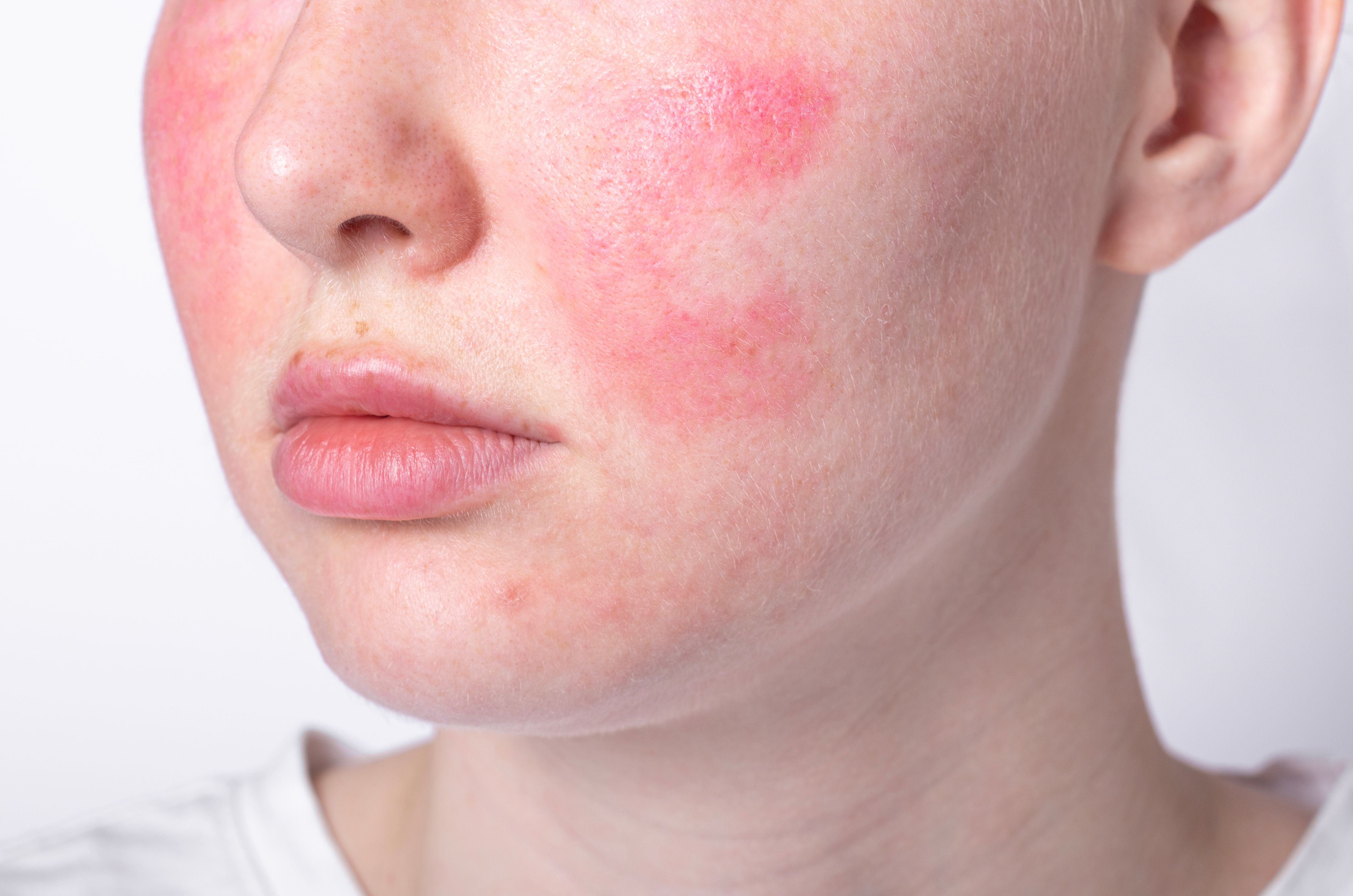- Acne
- Actinic Keratosis
- Aesthetics
- Alopecia
- Atopic Dermatitis
- Buy-and-Bill
- COVID-19
- Case-Based Roundtable
- Chronic Hand Eczema
- Chronic Spontaneous Urticaria
- Drug Watch
- Eczema
- General Dermatology
- Hidradenitis Suppurativa
- Melasma
- NP and PA
- Pediatric Dermatology
- Pigmentary Disorders
- Practice Management
- Precision Medicine and Biologics
- Prurigo Nodularis
- Psoriasis
- Psoriatic Arthritis
- Rare Disease
- Rosacea
- Skin Cancer
- Vitiligo
- Wound Care
News
Article
Isotretinoin’s Role in Rosacea Management
Author(s):
A recent review found the LDI shows significant symptom improvement, but needs further study for long-term maintenance.
Image Credit: © Rochu_2008 - stock.adobe.com

Rosacea is a chronic inflammatory skin condition that primarily affects women and those with lighter skin, with a prevalence ranging from 1% to 22% of adults.1 Researchers states genetic factors are involved in about 20% of cases.2 There are 4 recognized subtypes of rosacea: erythematotelangiectatic (ETR), papulopustular (PPR), phymatous (PR), and ocular.3
While the exact pathogenesis is not fully understood, research suggests it may involve factors such as demodex folliculorum overgrowth, staphylococcus epidermidis, an abnormal immune response, neurovascular dysregulation, and altered skin lipid profiles. Environmental triggers include extreme temperatures, UV exposure, spicy foods, alcohol, and smoking.1 Rosacea treatment options typically include topical and oral anti-inflammatory and antimicrobial agents.4
Isotretinoin has been explored for rosacea due to its anti-inflammatory and sebum-reducing effects.5 Despite its potential to induce remissions, isotretinoin's use remains limited, partly due to concerns about teratogenicity.1 However, researchers believe low-dose isotretinoin (LDI) (≤0.5 mg/kg/d) may offer a safer alternative with fewer adverse events, leading a recent review and meta-analysis to assess the efficacy of LDI in treating rosacea.6
Methods
The study included randomized controlled trials and non-randomized studies assessing the efficacy of LDI for rosacea management. Primary outcomes assessed were overall rosacea improvement, lesion counts, and erythema, while secondary outcomes included isotretinoin dosing, adverse events, and patient-reported quality of life (QoL). Literature searches were performed in Embase, MEDLINE, and Central up to May 9, 2023, with data extraction and study quality evaluation conducted by 2 reviewers. Meta-analyses were performed using standardized mean differences for inter-study comparisons. QoL was assessed using the Skindex and Dermatology Life Quality Index.
Results
Out of 435 studies screened, 16 were included in the analysis, comprising 7 comparative and 9 non-comparative studies. Among the 4 randomized controlled trials, 2 were rated high quality and 2 moderate quality by GRADE. Of the 12 non-randomized studies, 33% were of moderate quality and 67% were of low quality, with issues such as baseline disease severity discrepancies and limited control information.
The 16 studies involved 1445 patients, with a mean age of 49 years and 59% of whom were women. Researchers found LDI demonstrated a large effect in reducing lesion count and erythema, with improvements visible from 4 to 16 weeks and maintaining reductions even after treatment cessation. The review stated LDI resulted in 94.7% of patients achieving ≥50% improvement and 68.4% achieving ≥75% improvement. The treatment was generally more effective than topical therapies but showed less improvement in ocular symptoms compared to oral doxycycline. Researchers stated adverse events were rare, with a few cases of retinal detachment and transient lab abnormalities.
Conclusion
Researchers concluded that LDI is an effective treatment for moderate to severe or recalcitrant rosacea, leveraging its immunomodulatory, anti-inflammatory, and anti-angiogenic properties. They stated its effectiveness is attributed to reduced sebum production and changes in serum and skin fatty acids, although its impact on demodex folliculorum is less clear. While isotretinoin's use is limited to severe cases due to potential adverse events, regulatory constraints, and pregnancy risks, the review found it has shown minimal major adverse events (0.36%) and generally manageable adverse effects. Compared to oral tetracycline, researchers found LDI to be more effective for cutaneous rosacea, but oral doxycycline is superior for ocular symptoms and meibomian gland dysfunction. Despite study limitations, such as varying outcome measures and study quality, the review observed that LDI consistently improves rosacea symptoms with low adverse event rates. Researchers suggested that future research should focus on maintenance therapy and the specific impacts of LDI on different types of erythema.
References
- Rademaker M. Very low-dose isotretinoin in mild to moderate papulopustular rosacea; a retrospective review of 52 patients. Australas J Dermatol. 2018;59(1):26-30. doi:10.1111/ajd.12522
- Shemer A, Gupta AK, Kassem R, et al. Low-dose isotretinoin versus minocycline in the treatment of rosacea. Dermatol Ther. 2021;34(4):e14986. doi:10.1111/dth.14986
- Andrade FMX, Picosse FR, Cunha LPD, et al. Ocular surface changes in the treatment of rosacea: comparison between low-dose oral isotretinoin and doxycycline. Arq Bras Oftalmol. 2020;83(2):109-112. doi:10.5935/0004-2749.20200016
- Sbidian E, Vicaut É, Chidiack H, et al. A randomized-controlled trial of oral low-dose isotretinoin for difficult-to-treat papulopustular rosacea. J Invest Dermatol. 2016;136(6):1124-1129. doi:10.1016/j.jid.2016.01.025
- Ertl GA, Levine N, Kligman AM. A comparison of the efficacy of topical tretinoin and low-dose oral isotretinoin in rosacea. Arch Dermatol. 1994;130(3):319-324.
- King A, Tan MG, Kirshen C, et al. Low-dose isotretinoin for the management of rosacea: A systematic review and meta-analysis. J EurAcad Dermatol Venereol. 2024; 00: 1–8. https://doi.org/10.1111/jdv.20315
Newsletter
Like what you’re reading? Subscribe to Dermatology Times for weekly updates on therapies, innovations, and real-world practice tips.














